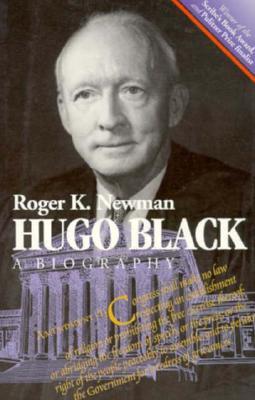Justice Hugo Black remains something of an anomaly in the history of the Supreme Court. A textualist who was contemptuous of the arbitrary mysticism of substantive due process, he nevertheless advocated the most extreme position on the issue of incorporating the Bill of Rights against the states through the 14th Amendment, a revolutionary doctrine that conflicted with the original understanding of that amendment. In other words, there is a little something for everyone in Black’s legacy, which perhaps justifies Jeffrey Rosen’s oxymoronic reference to Black in the New Republic as a “liberal strict constructionist.”
Roger Newman’s biography is thoroughly researched in the exhaustive way that biographies are these days—any [person at all connected with Black has been interviewed, and every scrap of paper examined. It is, however, occasionally obtuse, failing to illuminate the intellectual contradictions that marred Black’s jurisprudence. (And it is completely unfair in its relentless attacks on Justice Felix Frankfurter.) Newman is very good on Black’s membership in the Ku Klux Klan. Far from a nominal involvement with that organization. Black’s was in fact an enthusiastic participation. (“Hugo could make the best anti- Catholic speech you ever heard,” said one Klan member.)
Black was, of course, famous for his faith in what he viewed as the plain meaning of the Constitution. This faith was often misplaced, however. For example. Black’s literalist, no-law-means-no-law approach to the First Amendment is impossible to reconcile with the history of that provision and unworkable within the context of its incorporation. Black’s rigid view led him expressly to reject such necessary and historically sanctioned restraints on speech as defamation laws. This position was accurately characterized by Frankfurter as “doctrinaire absolutism.”
To his credit, though. Black remained steadfast in his commitment to the text of the Constitution even in the face of the outrages of the Warren and Burger Courts. He was one of the few voices of restraint on a Court that was hell-bent on reading its own egalitarian preferences into law. Black, for instance. scoffed at the notion that the death penalty violated the prohibition on cruel and unusual punishment found in the Eighth Amendment. “And he would have been,” says Newman, “the most vociferous opponent of Roe v. Wade, the Court’s 1973 decision that due process permits the right to abortion. Black flatly opposed any constitutional recognition of such a right during conference in a 1971 case.”
A proper view of the Constitution does not permit the use of natural law to decide a case. This position—which may be called constitutional positivism—is wholly consistent with a belief in natural law, and it hardly represents what Hadley Arkes intemperately condemns (in The Return of George Sutherland: Restoring a Jurisprudence of Natural Rights) as “indolence.” That Black was a thoroughgoing positivist in the sense that he repudiated any idea of natural law is an indication of nothing more than his own intellectual parochialism. One can embrace natural law reasoning and hold that the proper arena for its use is the legislature. Indeed, under our Constitution, it is entirely necessary to adopt this position inasmuch as there is no authority for a jurist to reach outside the document and its historical context for his decisions.
[Hugo Black: A Biography, by Roger K. Newman (New York: Pantheon Books) 741 pp., $30.00]

Leave a Reply